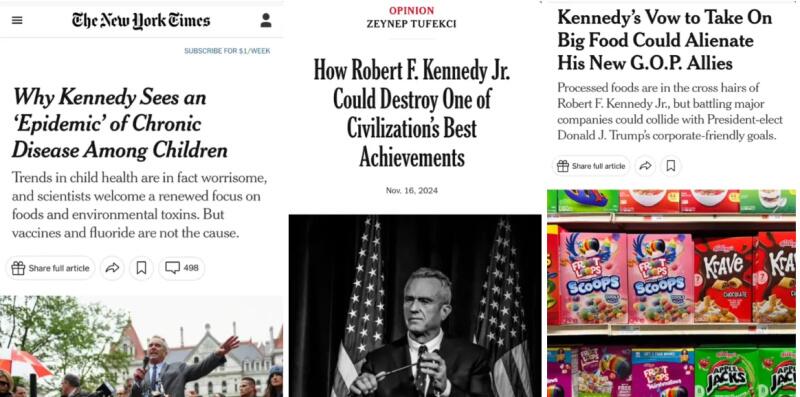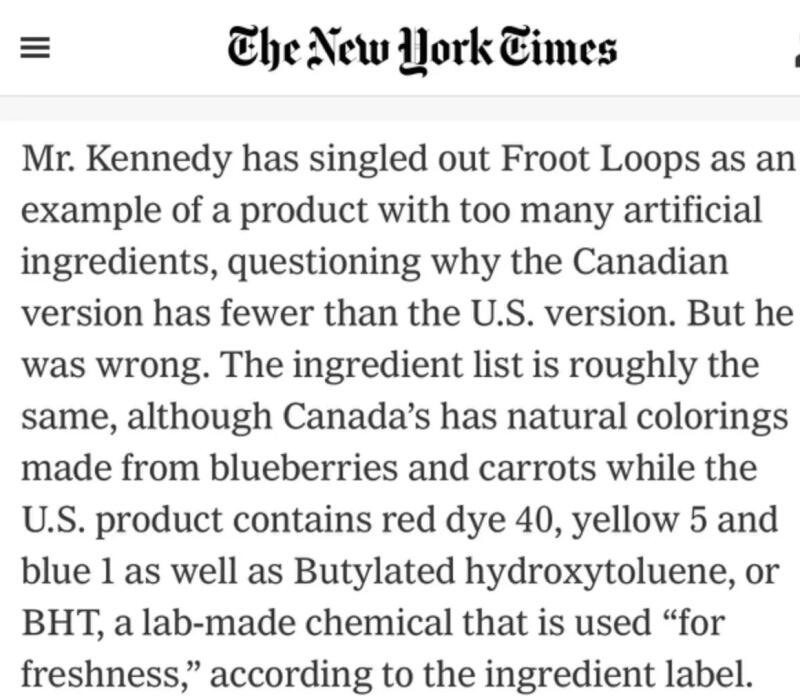by Josh Stylman via The Brownstone Institute,
As I often do on Sunday mornings, I was drinking my coffee and scrolling through my news feed when I noticed something striking. Maybe it’s my algorithm, but the content was flooded with an unusual amount of vitriol directed at Robert F. Kennedy, Jr.’s nomination as HHS Secretary.

The coordinated messaging was impossible to miss—talking heads across networks uniformly labeling him a “conspiracy theorist” and “danger to public health,” never once addressing his actual positions. The media’s concerted attacks on Kennedy reveal more than just their opinion of his nomination—they expose a deeper crisis of credibility within institutions that once commanded public trust.
The Credibility Paradox
The irony of who led these attacks wasn’t lost on me—these were largely the same voices who championed our most destructive pandemic policies.
As Jeffrey Tucker aptly noted on X this morning:

The Coordinated Response
This hypocrisy becomes even more glaring in the New York Times’ recent coverage, where dismissive rhetoric consistently replaces substantive engagement. In one piece, they acknowledge troubling trends in children’s health while dismissively declaring “vaccines and fluoride are not the cause” without engaging his evidence. In another, Zeynep Tufekci—who notably advocated for some of the most draconian Covid measures—warns that Kennedy could “destroy one of civilization’s best achievements,” painting apocalyptic scenarios while sidestepping his actual policy positions.
Meanwhile, their political desk speculates about how his stance on Big Food might “alienate his GOP allies.” Each piece approaches from a different angle, but the pattern is clear: coordinated messaging aimed at undermining his credibility before he can assume institutional authority.

The Echo Chamber Effect
You can almost hear the editorial conveyor belt opening as senior editors craft the day’s approved reality for their audience. The consistent tone across pieces reveals less independent analysis than a familiar pattern—mockingbird media still in action. As I detailed in How The Information Factory Evolved, this assembly-line approach to reality manufacturing has become increasingly visible to anyone paying attention.
What these gatekeepers fail to grasp is that this smug dismissiveness, this refusal to engage with substantive arguments, is precisely what fuels growing public skepticism. Their panic seems to grow in direct proportion to Kennedy’s proximity to real power. This orchestrated dismissal is more than a journalistic flaw—it reflects a larger institutional dilemma, one that becomes unavoidable as Kennedy gains traction.
The Institutional Trap
The Times faces an emerging dilemma: at some point, they’ll need to address the substance of Kennedy’s arguments rather than rely on dismissive characterizations—especially if he assumes control of America’s health apparatus. Just this morning, MSNBC anchors were literally shouting that “Kennedy is going to get people killed”—yet another example of using melodramatics and fear instead of engaging with his actual positions. Their reflexive ridicule strategy backfires precisely because it avoids engaging with the evidence and concerns that resonate with parents and citizens across political lines. Each attempt to maintain narrative control through authority rather than evidence accelerates institutional credibility collapse.
Beyond Kennedy: Redrawing Political Lines
The NYT’s analysis about Kennedy potentially alienating GOP allies particularly highlights their fundamental misunderstanding of the shifting political landscape. As a lifelong Democrat who still champions many traditional progressive values, Kennedy transcends conventional political boundaries. His message—”We have to love our children more than we hate each other”—resonates precisely because anyone who dismisses this crusade to restore American vitality as mere political theater is blind to the groundswell of people who’ve grown tired of watching their communities crumble under the weight of manufactured decline.
This isn’t just about Kennedy—it’s about the media’s inability to address the legitimate concerns of a disillusioned public. When institutions refuse to engage with dissenting voices, they deepen mistrust and fracture the shared foundation necessary for democratic discourse. While RFK, Jr.’s message has resonated across political boundaries, the media’s inability to address core issues—like regulatory failures—reveals just how out of touch they’ve become.
The Art of Missing the Point
Consider this fact-check from the same article: The Times attempts to discredit Kennedy’s Fruit Loops example, but inadvertently confirms his central point: ingredients banned in European markets are indeed permitted in American products. By focusing on semantic precision instead of the broader issue—why US regulators allow unsafe ingredients—the media deflects from substantive debates.

Senator Elizabeth Warren declared this week: “RFK Jr. poses a danger to public health, scientific research, medicine, and health care coverage for millions. He wants to stop parents from protecting their babies from measles and his ideas would welcome the return of polio.” Yet this alarmist framing dodges the simple question Kennedy actually raises: Why wouldn’t you want proper safety testing for chemicals we’re expected to inject into our children’s bodies? The silence in response to this basic inquiry speaks volumes about institutional priorities—and their fear of someone with the power to demand answers.
A Referendum on Manufacturing Consent
Say what you want about Trump, but his “fake news” remarks struck a chord that resonates deeper with each passing day. People who once scoffed at these claims are now watching with eyes wide open as coordinated narratives unfold across media platforms. The gaslighting has become too obvious to ignore. As I explored in We Didn’t Change, The Democratic Party Did, this awakening transcends traditional political boundaries. Americans across the spectrum are tired of being told not to believe their own eyes, whether it’s about pandemic policies, economic realities, or the suppression of dissenting voices.
“The party told you to reject the evidence of your eyes and ears.
It was their final, most essential command.”
–George Orwell, 1984
The Moment of Truth
With Kennedy potentially overseeing America’s health infrastructure, media institutions face a crucial inflection point. Fear campaigns and ad hominem attacks won’t suffice when his policy positions require serious examination. The machinery of coordinated dismissal—visible in identical talking points across networks—reveals more about institutional allegiance than journalistic integrity.
This moment demands something different. When Kennedy raises questions about pharmaceutical safety testing or environmental toxins—issues that resonate with families across political lines—substantive debate must replace reflexive ridicule. His actual positions, heard directly rather than through media filters, often align with common-sense concerns about corporate influence on public health policy.
This institutional pattern of manufactured authority connects directly to themes I explored in Fiat Everything earlier this week—systems built on decree rather than demonstrated value. They don’t sell weapons—they sell fear. The same forces that control monetary policy now seek to dictate public health discourse.
Breaking the Machine
The solution won’t come from institutional gatekeepers (that’s what got us here) but direct examination. We all need to:
Listen to Kennedy’s complete speeches rather than edited soundbites
Read his policy positions rather than media characterizations
Examine the evidence he cites rather than fact-checker summaries
Consider why certain questions about public health policy are deemed off-limits
I’m not suggesting we accept every contrarian position, but rather that institutional credibility must be earned through rigorous analysis rather than assumed through authority. Until then, coverage like these recent Times pieces will continue to exemplify the very institutional failures that fuel the movements they seek to discredit. As Kennedy approaches real institutional power, expect these attacks to intensify—a clear signal of just how much the guardians of our manufactured consensus have to lose.
Republished from the author’s Substack
https://www.zerohedge.com/political/manufacturing-dissent



